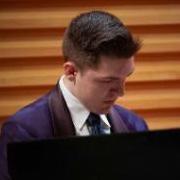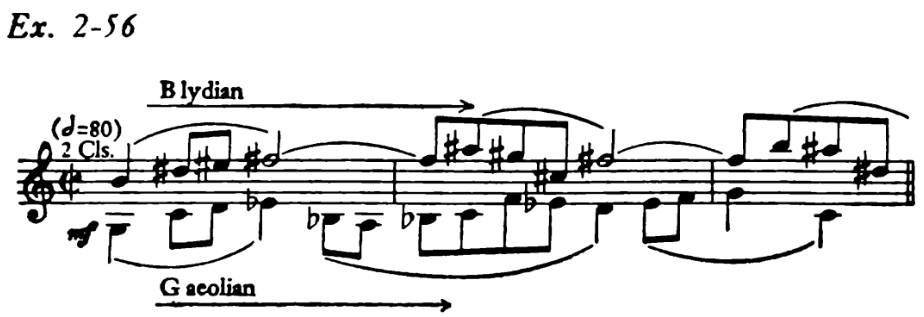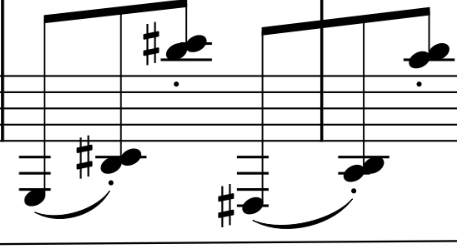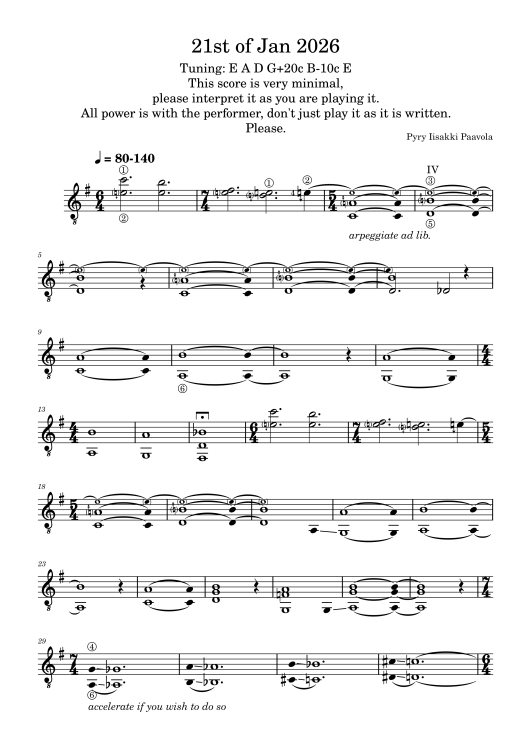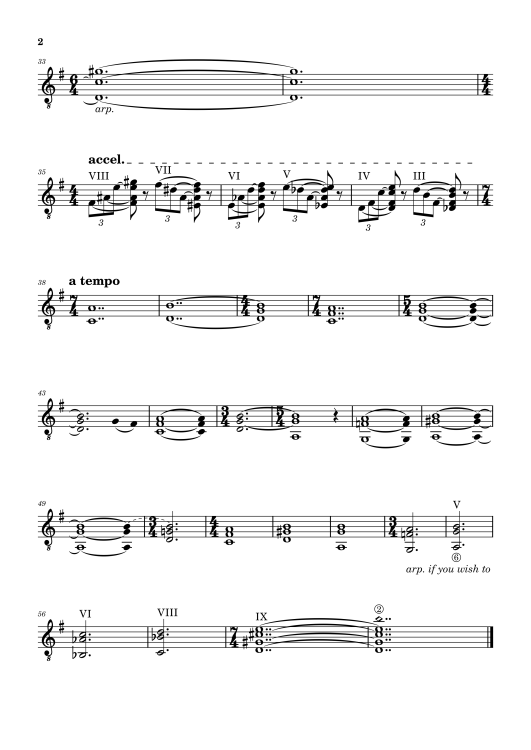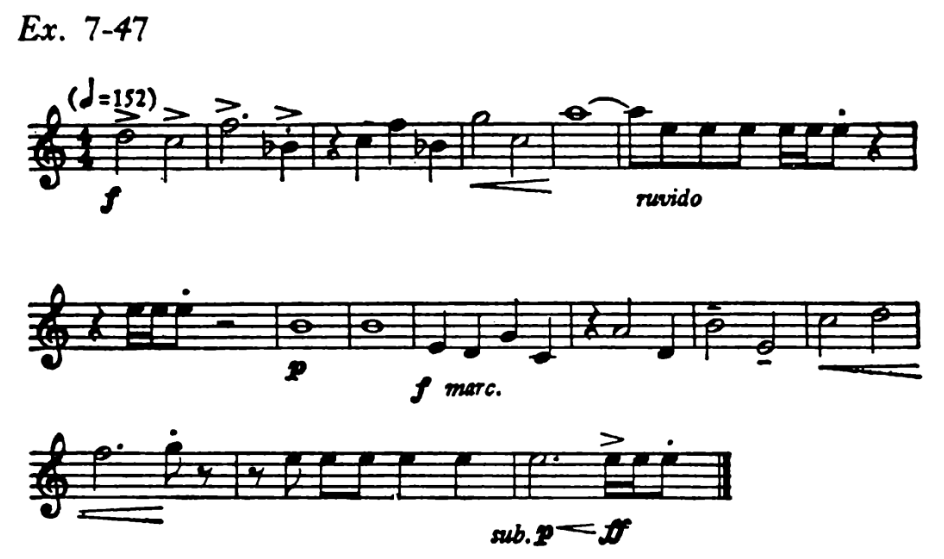Leaderboard
Popular Content
Showing content with the highest reputation since 02/19/2026 in all areas
-
Wow this is great! And you're getting a performance? Very happy for you, you should update this with the audio once you get it! I've made edits to my music posts too, and I think it's easiest to add the revised audio to your original post, or just remove the old one and replace with the new. That way when people click on your music they're greeted with the version you want them to hear 🙂 Great stuff, looking forward to hearing more from you2 points
-
Dude these are hard to keep up with lol... but I guess I've been busy and haven't been on here as much... sorry! Listening... Ok cool! I'm almost finished with a counterpoint in two voice piano type of piece, so this is right up my alley. The language is different, but the upper part kinda looks familiar lol. I really wonder if it would have sounded better having the intervals closer together, but with them far apart it was like an eerie bi-tonal carnival ride to me or something 😄Were you mainly thinking of the consonance of intervals? It was dissonant but smooth. I know it was just an exercise and you had a prompt, but what about texture change? I'd love to hear staccato bass or something, even if just a segue in the middle. Cool piece! Have any of these exercises given you grander ideas for the themes you've used? What do you feel you've gained so far in these compositional studies? Hopefully your next major work has even more craftsmanship from your work. Well done!2 points
-
Some badges must me earned. Some are given freely, but there is one badge that rules them all. Legend holds that a mysterious "better than thatguy" badge is given only to a chosen few. You must search through the members profiles and sift through their badges to gain further knowledge. I wish you well in your quest.2 points
-
Hi @MrBelegro! Welcome to the forum! For the Outstanding Orchestrator badge, you may look into pieces below which are awarded the badge for your reference: For the "Better than Thatguy" badge, actually it's named so because one of our moderator's username is @Thatguy v2.0, so you may check out his works to see if you are better than him or not lol! Henry2 points
-
Mother and Son 12-9-25.pdfHi all, Once again I resurrected an old work which needed a dusting off and a new look. It's called Mother and Son ... I describe the playful and sentimental interactions of a Mother and child as they play/interact in the park. Mark2 points
-
Hi Tunndy, I notice your glissando lines have gone a bit haywire in Bars 54-55. Also in Bars 23 and 41 Violin II, you should flip the direction of the note stalks to make it clear what's going on there. Same in Bar 61 Violin I. Bar 55: some rests need deleting in the harp and Violin I. Same in Bar 66 Bass Drum, and Bar 69 various instruments. Plus a few more places where you have unnecessary rests. Bar 74: voices need tidying. Other than that good job! Also liked your recent Liszt orchestration of "La Campanella".2 points
-
2 points
-
I don't know why, but it sounds neoclassical to me. I imagine this piece in an 18th-century drawing room. I think it has an intimate, somewhat playful feel to it. Good work on these exercises.2 points
-
I‘m glad to hear that, and to see that you are not too „disappointed“ or overwhelmed by the discussions. Since I see that you are (again) in „good hands“ with @muchen_ continuing a detailed discussion, I will not go so much in detail, but give only some more general thoughts. I‘ve noticed your new version (v3.mp3 – not yet v3m.mp3). Will say that I put it together with the first one on my playlist and listened them, in a loop, perhaps a dozen times while walking. I do the same with my own compositions (where I use different piano soundfonts producing 10 different recordings of the same piece) and listen to them extensively while I take a long walk. This approach helps me to judge the piece whether it is fluent and I get distracted from my thoughts every time something „rattles“. Will say, a more relaxed review on the work thru listening only – being away from the score – is very useful to find out bars which need overhaul or get new ideas how a piece could be continued. Coming to the two versions of your invention I‘ve listened, I must say they are only slightly different (which is good in the sense that your corrections/modifications had no impact on the overall mood). The longer I listened them, the more I loved the subject with the repeated notes! Yes, in the first version there are the few bars, where the „octaves“ produced a bit „thin“ sound in the counterpoint. They have gone away in the newer version (what is good) except of – in my listening impression - two bars, one at the first subject entry in the lower voice and one bar nearly the end. So, I will now look to the score to see whether I can find out what I thought to have heard. ... The one bar which retains to sound „thin“ is bar 4 and the other one is bar 22. Yes there is an octave on an A on the second of the repeated notes. But I think, it‘s not the octave only - there are other ones on a C in bar 3, last of the repeated notes and on a F# in bar 5, second of the repeated notes – which don‘t need „correction“ in my listening impression. I think the „problem“ in bars 4 and 22 is more harmonic nature, I would replace the three sixteenth notes in the upper voice [G A B] with [E# F# G#] emphasizing the dissonance between B major and the four repeated A naturals. Because this was more detailed than I initially intended to be in this repost, so take it not too seriously. The more general question I have – and you probably have yourself – is what do you intend with, for example, this particular invention. If it is an exercise, you‘ll have learned something, especially about „octaves“ – and can leave it at that, going to the next one. But perhaps this is not the best idea to continue with the 1601st exercise, as you seems to me to be already somewhat „overteached“ and „overpracticed“. If you are about to create a „full fledged“ composition of it, we could further talk about episodes, cadences and a more elaborated ending. However, I suspect that you would prefer for that purpose another piece with a subject of your own, which than will be „complete your baby“. For that case, I would suggest you to put your composition in a more larger „framework“, such as in a cycle of, for example of six or twelve inventions, calling it somewhat like „Mein Notenbüchlein“ 😅. I think, that‘s quite enough for today! Greetings, Wieland.2 points
-
Hallo @TristanTheTristan! Even your Sonatina has a length of a Sonata, I think it was wise to call it „Sonatina“ only, due to its youthful spirit and its refrain from the drama and heaviness of a „full-fledged“ sonata. So it is a cheerful, enjoying piece at all! However, what refuses me to count it as a piece that I would enjoy to put in my playing list is its hyperactivity expressed by the much to fast and repeating passages with ornamentations (trills, tremolos etc.) which heavily remind me on your signature „TristanTheTristanTristanTheTristanTristanTheTristanTristanTheTristanTristanTheTristanTristanTheTristanTristanTheTristanTristanTheTristanTristanTheTristanTristanTheTristanTristanTheTristanTristanTheTristanTristanTheTristanTristanTheTristanTristanTheTristanTristanTheTristanTristanTheTristanTristanTheTristanTristanTheTristanTristanTheTristanTristanTheTristanTristanTheTristanTristanTheTristanTristanTheTristanTristanTheTristan ….“. I can therefore only emphasize @PeterthePapercomPoser' questions about playability for a human performer and would love to hear the piece as it would be interpreted by a real pianist, whether it's a live recording or a recording from a MIDI file. In the latter case, however, more sensitivity to the technical abilities of a human pianist and their enormous nuances in articulation, dynamics, tempo, etc. would be required.2 points
-
Hallo @Frederic Gill! I have read the thread about your „2-part invention in counterpoint“ and since there had already been lively discussions I decided to take a look on another piece which has not got a review yet. I like the motif (or „subject“) which is indeed somewhat „stubborn“ because of its repeated notes (but there are many famous fugues with repeated notes in the subject). And so, your decision to vary the motif sometimes to avoid that repeated notes is quite a good idea. The counterpoint is well chosen rhythmically, giving the entire piece a continuous flow and its „funny“ character. As far as I remember from the other thread, there were some dispute about „parallels“ and „octaves“ which was – also in my opinion – somewhat „overteaching“ (I couldn’t follow all arguments or „issues“ without going into detail too deep), so that I can understand that you’ve deleted most of the posts. But to be honest, after listening to your E minor invention, I can understand what the other commenters meant: Not „parallel octaves“ (or „parallel fifth“ as to be avoided in counterpoint generally) are problematic, but only the occurrence of the same note (in an octave) on a strong beat that makes the piece sound something „thin“ at that particular note. This is the case in a two-voice counterpoint only. If you had a third or fourth voice there would be enough harmonic material overall (and that might be the reason that writing a two-part fugue is much more challenging than a three- or four-voice fugue and why there are so few of them). I think, you can solve the problem, for example by varying your counter-motif in that places where it creates the octave. You will then lose the smooth motion at these points and have to insert a leap, but that might emphasize the humorous character of the entire piece!2 points
-
2 points
-
"Night Train Home" I wanted to write a jazz instrumental but never studied jazz technique before. So I dug into jazz theory three weeks ago and began writing my first jazz quintet! I wrote all the chords and notes and performed the virtual instruments on keyboard. Except drums which started with midi loops that I heavily edited. No AI. Comments welcome!1 point
-
Ello! This is was more of a joke than anything. So please don't take it seriously. And its one of the few times i compose baroque music because i absolutely SUCK at writing baroque music. I hope you guys like it!1 point
-
Thanks for the comment! I used an Alto kalimba for this, thats the reason i composed in F minor actually because i saw the image of the range of the chromatic alto kalimba and its from F to F. I would post the score surely but its full of parallel octaves and fifths so i decided not to 😬 and also most of the violin parts are probrably unplayable with jumps larger than a 10th!1 point
-
Sylva Train Runnin' | Official Motion Picture Score from A Fire Within Hello! Over the last calendar year, I have been creating my first short-film called A Fire Within. When completed, the film will follow the tragedy between two friends: Sam and Andy. The story focus on the theme of betrayal as being cordial does not stop greed or jealousy from bubbling within someone. This score is paired with a travel sequence in the film and is my 4th attempt at writing for Big Band Swing. I am very happy with the result and simply wanted to share it! The style was meant to replicate late 40s/ early 50s swing to match the era in which the story takes place. I sampled a little of Miller's "Chattanooga Choo Choo" to help tie into the railroad theme with the main structure being based in verse-chorus with multiple repeats and a key change. If you would like to know more about the score, go to the "About" section on page 4! ________________ Program Note: A Fire Within is an original story written by Mason Kistler detailing betrayal between two friends. Featuring an original soundtrack, soundscape, voice cast and more, this story established itself as the first short-film made solely in the video game Railroader, which was released in December, 2023. Join the orchestra as they bring you in towards this cinematic universe and involve yourself in their soundscape. All aboard as the saxophones open the throttle and the ensemble leaves the station! [DO NOT REPLICATE]1 point
-
Hello @MK_Piano! Yes, that’s really a good swinging big band piece which immediately reminds at Glenn Miller’s „Chattanooga Choo Choo“. Good old steam trains seem to have inspired many composers and musicians because of their „sound“ which comprises „rhythmic“ elements (the start of the locomotive, increasing and decreasing speed, the rattling noise when driving over the track joints) and melodic elements (the puffing of steam, the whistling of the locomotive, or the squeaking of the wheels when braking) which animate to be imitated musically. Who would write a piece inspired by the noises a nowadays train produces? Another good example of a piece dedicated to a steam locomotive is Arthur Honnegger's “Pacific 231”, which is not a jazz piece, but rather a dramatic symphonic work. I liked it very much and I must say that the repetitive character mentioned by @PeterthePapercomPoser didn’t bother me, especially taken into account the purpose of the piece as soundtrack for a movie where it does not appear in its entirety but is cut into parts to underpin the individual scenes. Or whenever it would be played in a bar as the background music, the most visitors would not even notice it.1 point
-
Hello @L.S Barros! I think this is a wonderful concerto! I don't think you suck at Baroque music at all! I found the whole thing quite easy listening and unique and enjoyable! Did you write this for the 17-key variety of Kalimba? Seems like a very restricted range to write for, but you seem to have pulled it off! Btw, do you have a score? You would probably get more reviews if you also posted the score. Thanks for sharing!1 point
-
Hi to all my fellow musicians. Here's my latest piece for piano, that I spent the last two days writing. Haven't quite finished the phrasing and dynamics yet. I may possibly extend the work; but I'm not quite sure yet. Hopefully I haven't accidentally stolen ideas from other pieces I've heard? I know the initial chord progression of C#m to Am(maj7) came from a You Tube video; but can't remember which piece they were discussing. (Pretty sure it was from a film score; but can't remember which one.) Anyway, hope you like it. I wrote it for a concert in May. P.S. Can you guess which composer inspired me to write this? (N.B. Revised scores will be posted below.)1 point
-
I come to you with yet another piece prompted by an exercise from Persichetti's "20th Century Harmony" - Chapter 2: Scale Materials. This time the prompt was "11. Extend the following polymodal and polytonal passage." I chose to change the instrumentation to Bass Clarinet and Sopranino Clarinet as I thought that increasing the distance between the voices would preserve their individuality. I also heard the bottom voice as being more in C dorian rather than in G aeolian. But for the end of the piece I defaulted to a kind of linear cadence rather than ending each voice on its individual tonic. Thanks for listening and I hope you enjoy and let me know what you think!1 point
-
it's been a while since I posted here, here's my attempt at covering Bohemian Rhapsody 😁 Bohemian_Rhapsody for orchestra.mp3 Bohemian_Rhapsody orchestra.pdf1 point
-
Hello @Tunndy! You have picked the perhaps most covered or orchestrated rock/pop song ever, the iconic Bohemian Rhapsody, which I consider to be a huge challenge. Everyone who hears the piece knows it and has its own expectations in the sense of „does it sound like the original“. I had the chance two years ago to attend a live performance of an orchestra and choir, and I was impressed how realistic that was performed - very close to Queen’s original sound. But that's also the problem when everyone is sensitized to noticing every little “mistake” or deviation from the original: you're faced with the challenge of bringing your own personal touch or interpretation to it. And that's exactly what you've done very well. The longer I listen to your orchestration, the more I notice some beautiful interpretations that really make it “your” piece. I particularly liked the ending, from bar 103 onwards! However, I could imagine that this personal interpretation could go even further. Therefore, as an inspiration, I have linked a YouTube video of David Bennet who reinterprets Bohemian Rhapsody in different modes or scales, which I find very fascinating. Thank you for sharing, I very enjoyed it!1 point
-
Outstanding orchestrator and Better than thatguy (in this case I've outbeaten Julius Fucik and Leo Chernetsky and that was my goal) for "March Hare" march1 point
-
I'm surprised no one wrote anything here YET, so: I'm a history buff, theory buff and orchestration buff I got performed just once... Am a period composer (of late 19th century and early 20th century dances) Brass aficionado and woodwind aficionado Dance music impresario for that matter Amorous romanticist Programmatic composer I don't know if 1930's cartoon music counts for "film buff" or "film music enthusiast" but I am a buff of that And I almost composed the soundtrack to a pastiche of that but that thing was cancelled so I'm not even a debatable "film composer"1 point
-
A high tension piece that wants to resolve but ultimately fails in doing so. We almost get there at 0:20. It makes me wonder if you don't really want to go into teaching, or if you have anxiety over the prospect! Overall, I'd say one of your more interesting castings. Honestly, I was surprised that you resolved this at the end.1 point
-
1 point
-
I also very much enjoyed your work here with its introspective mood. I do have a question though; measure 28 - can this measure and others be played up to tempo? It appears to require great dexterity. Mark1 point
-
Huh, those two different scales together remain dissonant, even after listening several times. Interestingly, while you separated the two voices clearly, for me the base clarinet „shadows“ the lydian fourth in the soprano, so that its characteristic is not so clearly perceptible. I was just a bit confused whether the score/recording is transposing or not. I think, the score should be read „as is“ since the scales (B lydian vs. G aeolian) are explicitly mentioned in the exercise. But whenever I listen to the recording, I think the clarinets are playing a whole note lower, thus are transposing ... However, very interesting exercise – while I would prefer a slightly more harmonic approach in my own compositions.1 point
-
Hi everyone, I finished a new piano piece called Cloud Ame and wanted to share. I hope you enjoy listening and welcome any feedback! Thank you1 point
-
@ferrum.wav thank you for your kind feedback and anaylsis! "Fragmented ideas" describe exactly my composing style and process!😄 I am happy you enjoyed the piece and the ideas come through I intentionally left out the musical expressions and markings out of the score (half of it is me being lazy and the other half is that I think music should be freely interpreted by the player) but I do agree I should add the musical markings to be clear. Maybe in the future if I have enough songs to publish a book. That is my dream 🙂1 point
-
Hi, I really don't quite understand the theory underlying the composition ... (although as a retired professor of social work, clinician, and school administrator ... retired); if you have any questions about a career in social work feel please to ask me. Now about the music ... my only observation is the pairing of the English Horn with the French Horn. I think matching dynamics would be a bit difficult since the timbre and projection of the instruments are quite different especially in the lower and upper registers. The work is quite pleasant to listen to .... and flows quite nicely. Mark1 point
-
A very beautiful piece that sounds intimate and effective. It sounds like it's being played live, doesn't it?1 point
-
Hi all, here is a composition I began in 2011. I rediscovered it in my computer files and decided to rework it and give it some new life. Hope you enjoy the work. All comments welcome as usual.1 point
-
this is a really nice and short piece !! despite how simple it is, i find it fascinating how you manage to use all of the fragmented ideas effectively. for example, how you use the cadence on b15-16 and the subsequent usages of which throughout for the ending and just leave it hanging at the V, it really gives you that floating feeling. add that with the gentle arpeggio, harmonies, and melodies and you've successfully painted a tranquil feeling on the mind if i could give feedback, i'd probably give ones for the score. maybe it could be given more information such as the tempo, slurs, dynamic, and expression markings other than that, it's a great piece. i thoroughly enjoyed listening to it. thanks for sharing !!!!!!1 point
-
1 point
-
That sounds fantastic. Perhaps a version without so many annotations would be clearer. Although for educational purposes it's great. And well, you've left me wanting the second part.1 point
-
MP3 Play / pause Persichetti Exercise 2 - 57 0:39 1:25 volume > next menu Persichetti Exercise 2 - 57 > next PDF Persichetti Exercise 2 - 57 Nice! You have a nice sense of atonalism. It has an eerie and mysterious feel to me. (ending on a V7? That is one reason.) Also the use of the whole tone scale is nice and surreal. It is not fully used, but definitely has the characteristics of it.1 point
-
Here is an extended and revised version of the piece. I’m still experimenting with having a wider variety of instruments, for now they are the same. I’m in over my head with making arrangements like this so all feedback is appreciated1 point
-
This time I share with you a musical quote from "The Occult" by Colin Wilson. And if you've gotten this far, thanks for reading!1 point
-
This time I wrote a piece inspired by an exercise from Chapter 2 of Persichetti's "20th Century Harmony" on Scale Materials for 2 Bb Sopranino Clarinets and Bb Bass Clarinet. The prompt was "14. Construct a canon for three clarinets in which each performer plays a different synthetic scale on a different tonic." Synthetic scales are scales that are "specially constructed, often non-traditional scales created by altering, adding, or omitting notes from standard diatonic (major/minor) scales." I chose to use the written C Acoustic Scale, F Ukrainian Dorian Scale, and B Phrygian/Dorian Scale. I've been told that I should have perhaps tried to choose scales that would sound more harmoniously with each other. But, funny enough, that's exactly what I was trying to do. I didn't choose scales at random but tried to tailor each part of the canon to the previous material by improvising a scale and only later figuring out what scale I was using. But let me know what you think! Thanks for listening! P.S.: I have added a 2nd version of the piece where I have changed the relations of the tonics to each other to be tertian rather than quartal as in the 1st version. In the 2nd version I use written C Acoustic Scale, E Ukrainian Dorian Scale, and G Phrygian/Dorian Scale. Let me know which you prefer!1 point
-
I was thinking about the ice that's formed here on the ocean. How in foggy conditions it looks like it never ends. I'd like to go sit at the beach of my cottage with an omni mic and just stare into the fog and play this... This is also a slight experimentation on both microtonal tunings (aesthetic) and in player's freedom. You'll note that my recording sounds a bit different to this (and was actually played on steel string guitar), but that's the point :D. I often feel that the player is not given enough free reign to interpret what they are playing - not enough free reign to bring themself to the stage. So this is a slight complaint to that I suppose. All thoughts, feelings, colours, landscapes, gibberish, textur 21st of jan.mp3 es that come to mind please tell me.1 point
-
It's been too long! I thought I would share this piece written for my theory and composition class at Berklee. We were asked to work with a couple of "exotic scales" from a selection including the whole-tone scale, the octatonic scale, and modes other than those derived from the major scale. I felt drawn to the Lydian Augmented and Spanish Phrygian modes. I ended up with a contrapuntal rock instrumental in rough ABCA' form. The A section is in B♭ Lydian Augmented, the B section is in G Spanish Phrygian, and the C section an unbroken transition into D Spanish Phrygian. Finally, I modulate with the common tones D and A back to B♭ Lydian Augmented, for the A' recapitulation. The title (Iridescence) was inspired by my understanding of modes as a concept. With many modes sharing the same collection of notes, the tonic note that each mode centers on is what makes it unique -- gives it a unique color. And, iridescence is when something appears in different colors depending on the angle of viewing. I see that as a fitting metaphor. The artwork is my own, made with ProCreate. I didn't paint it for this track, but as a birthday present for my mother, inspired by Kate Bush's song "Kite". She is a massive fan of Kate's and introduced me to her when I was a little girl. I rediscovered her recently and I've been spending a lot of time with her early work. My current favorite album is Never for Ever...whose influence I thought was bleeding into this track. So, in the end there is some relation. 🙂 I hope you enjoy! Any feedback on both the mix and composition is more than welcome. ~ GP P.S. I was required to include a detailed score for the assignment. It might be too precise for a rock track in general, but if enough people are interested I will upload that, too.1 point
-
Unique and very calming. The crescendo and decrescendo throughout gives the piece an interesting sense of grounded emotional instability.1 point
-
Continuing with the Scale Materials Chapter in Persichetti's "20th Century Harmony" I wrote this Clarinet Quintet. The prompt was "8. Construct a solo clarinet line in the lydian mode supported by phrygian string quartet harmony. Set both the melody and harmony on the tonal center Bb." Thanks for listening and I hope you enjoy and let me know what you think!1 point
-
This may be a good idea... for example if a member collects some number of manually awarded badges they get an extra badge for it like Bronze/Silver/Gold Collector or something like that!1 point
-
Continuing with the polychordal exercises in Persichetti's "20th Century Harmony" I wrote this Brass Sextet. The prompt was "2. Harmonize the following first-trumpet melody in six part brass harmony (three trumpets and three trombones). Use a predominantly polychordal texture with occasional unison relief." I chose to use two trumpets, two horns and two trombones instead of the suggested instrumentation. Thanks for listening and I would appreciate any of your comments!1 point
-
1 point
-
Make it more chaotic. You are not Bach. Maybe listen to some of my works that were supposed to be fighting song for a game. I am going to put them on here later.1 point
-
One more thing orchestral I can post, an opera overture from 1995. If I enter any of the opera, probably extract a suite or something if I don't feel like working myself to death! Overture to the Opera Hypochondria Free Sheet Music by Robert C. Fox for Various Instruments | Noteflight1 point
-
1 point

.thumb.png.8b5b433a341551e913a34392660bc95b.png)





